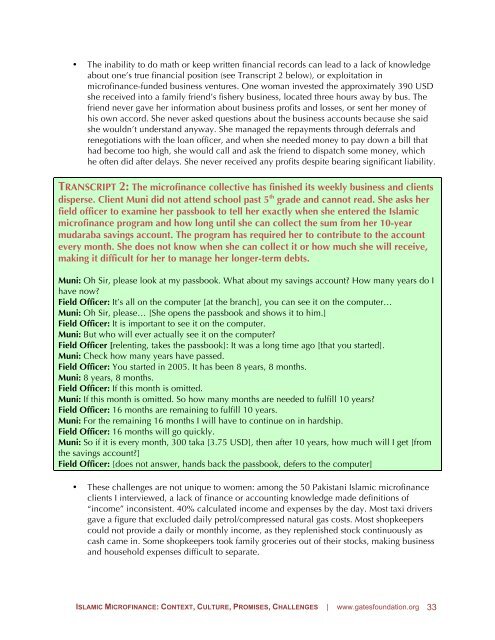ISLAMIC (MICRO)FINANCE
TrYIw
TrYIw
You also want an ePaper? Increase the reach of your titles
YUMPU automatically turns print PDFs into web optimized ePapers that Google loves.
• The inability to do math or keep written financial records can lead to a lack of knowledge<br />
about one’s true financial position (see Transcript 2 below), or exploitation in<br />
microfinance-funded business ventures. One woman invested the approximately 390 USD<br />
she received into a family friend’s fishery business, located three hours away by bus. The<br />
friend never gave her information about business profits and losses, or sent her money of<br />
his own accord. She never asked questions about the business accounts because she said<br />
she wouldn’t understand anyway. She managed the repayments through deferrals and<br />
renegotiations with the loan officer, and when she needed money to pay down a bill that<br />
had become too high, she would call and ask the friend to dispatch some money, which<br />
he often did after delays. She never received any profits despite bearing significant liability.<br />
TRANSCRIPT 2: The microfinance collective has finished its weekly business and clients<br />
disperse. Client Muni did not attend school past 5 th grade and cannot read. She asks her<br />
field officer to examine her passbook to tell her exactly when she entered the Islamic<br />
microfinance program and how long until she can collect the sum from her 10-year<br />
mudaraba savings account. The program has required her to contribute to the account<br />
every month. She does not know when she can collect it or how much she will receive,<br />
making it difficult for her to manage her longer-term debts.<br />
Muni: Oh Sir, please look at my passbook. What about my savings account? How many years do I<br />
have now?<br />
Field Officer: It’s all on the computer [at the branch], you can see it on the computer…<br />
Muni: Oh Sir, please… [She opens the passbook and shows it to him.]<br />
Field Officer: It is important to see it on the computer.<br />
Muni: But who will ever actually see it on the computer?<br />
Field Officer [relenting, takes the passbook]: It was a long time ago [that you started].<br />
Muni: Check how many years have passed.<br />
Field Officer: You started in 2005. It has been 8 years, 8 months.<br />
Muni: 8 years, 8 months.<br />
Field Officer: If this month is omitted.<br />
Muni: If this month is omitted. So how many months are needed to fulfill 10 years?<br />
Field Officer: 16 months are remaining to fulfill 10 years.<br />
Muni: For the remaining 16 months I will have to continue on in hardship.<br />
Field Officer: 16 months will go quickly.<br />
Muni: So if it is every month, 300 taka [3.75 USD], then after 10 years, how much will I get [from<br />
the savings account?]<br />
Field Officer: [does not answer, hands back the passbook, defers to the computer]<br />
• These challenges are not unique to women: among the 50 Pakistani Islamic microfinance<br />
clients I interviewed, a lack of finance or accounting knowledge made definitions of<br />
“income” inconsistent. 40% calculated income and expenses by the day. Most taxi drivers<br />
gave a figure that excluded daily petrol/compressed natural gas costs. Most shopkeepers<br />
could not provide a daily or monthly income, as they replenished stock continuously as<br />
cash came in. Some shopkeepers took family groceries out of their stocks, making business<br />
and household expenses difficult to separate.<br />
<strong>ISLAMIC</strong> <strong>MICRO</strong><strong>FINANCE</strong>: CONTEXT, CULTURE, PROMISES, CHALLENGES | www.gatesfoundation.org 33


